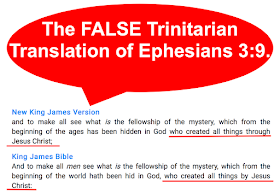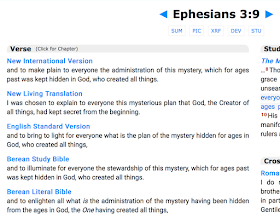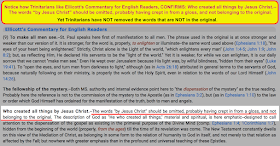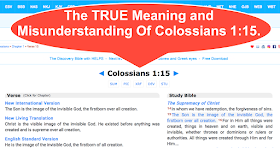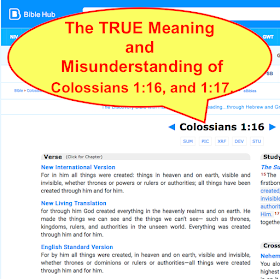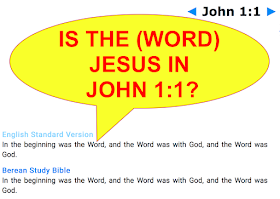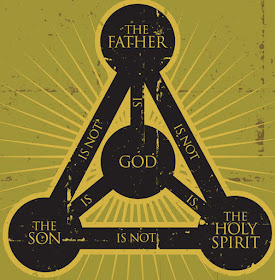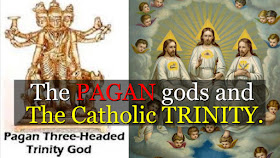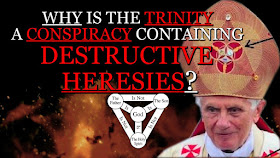The incarnation of Christ is another false Trinitarian doctrine, deceiving MOST of Christianity, that was adopted by the Catholics from pagans with the pagan TRINITY and the false teaching of the SOUL surviving life after death, that was the faith of the Egyptians.
-----------------------
Adam:
Trinitarians often claim that Jesus is only called the Son of God because of His birth in Bethlehem. But being born in human flesh, Christ became the “Son of man” at His incarnation, not the “Son of God” which He already was.
-------------------
1 Rebut by Simon Brown:
Trinitarians have got many things wrong.
There are NO teachings in the WHOLE bible saying or teaching Jesus was GOD who became flesh, or a PRE EXISTING BEING, or an ANGEL or a SPIRIT, or a LIVING BEING, before He was BORN, in John 1:14.
Jesus BECAME the “Son of MAN” proving He was 100% MAN, and the Son of GOD, from when He was BEGOTTEN from His birth in Bethlehem.
Jesus is the Son of GOD, because He was BORN directly from GOD in the womb of Mary with NO human Father, which is why GOD is the Father of Jesus Christ.
---------------------
Adam:
Scripture reveals many times and in many ways that Jesus was God's Son “before” God sent Him into the world, not after. The following two verses for instance say that God sent His Son into the world. Hence He was already God's Son before He sent Him. “because that God sent His only begotten Son into the world, that we might live through Him.” (1 John 4:9) “For God sent not His Son into the world to condemn the world, but that the world through Him might be saved.” (John 3:17)
----------------------
2 Rebut by Simon Brown:
SENDING Jesus or Jesus being SENT, does NOT in anyway prove Jesus PRE EXISTED before He was SENT.
Jesus is “from God,” “from heaven” or “from above” in the sense that God is his Father and thus his origin.There are also verses that say Jesus was “sent from God,” a phrase that shows God as the ultimate source of what is sent. John the Baptist was a man “sent from God” (John 1:6), and it was he who said that Jesus “comes from above” and “comes from heaven” (John 3:31). When God wanted to tell the people that He would bless them if they gave their tithes, He told them that He would open the windows of “heaven” and pour out a blessing (Mal. 3:10 – KJV). Of course, everyone understood the idiom being used, and no one believed that God would literally pour things out of heaven. They knew that the phrase meant that God was the origin of the blessings they received. Still another example is when Christ was speaking and said, “John’s baptism—where did it come from? Was it from heaven or from men?” (Matt. 21:25). Of course, the way that John’s baptism would have been “from heaven” was if God was the source of the revelation. John did not get the idea on his own, it came “from heaven.” The verse makes the idiom clear: things could be “from heaven,” i.e., from God, or they could be “from men.” The idiom is the same when used of Jesus.
Jesus is “from God,” “from heaven” or “from above” in the sense that God is his Father and thus his origin.
The idea of coming from God or being sent by God is also clarified by Jesus’ words in John 17. He said, “As you sent me into the world, I have sent them into the world” (John 17:18). We understand perfectly what Christ meant when he said, “I have sent them into the world.” He meant that he commissioned us, or appointed us. No one thinks that we were in heaven with Christ and incarnated into the flesh. Christ said, “As you have sent me, I have sent them.” So, however we take the phrase that Christ sent us, that is how we should understand the phrase that God sent Christ. Buzzard, pp. 154-157 Norton, pp. 246-248
--------------------------------------
Adam:
Scripture also informs us that Jesus was the Son of God before all things were created.
Paul wrote in regards to Christ that,
“He is the image of the invisible God, the firstborn over all creation.”
(Colossians 1:15 NKJV)
Note that the latter part of this verse is poorly translated in the KJV which says, “Who is the image of the invisible God, the firstborn of every creature.” (Colossians 1:15 KJV) As a result there are some who use the King James Bible to imply that Christ Himself was a created being. But such an interpretation is contradicted elsewhere in Scripture such as John 1:1-4 and Colossians 1:16-17 Thus we see that Paul is telling us that Christ was “Begotten First or Born Before all creation” because all of creation was by God through His Son Jesus Christ.
-----------------------------
3 Rebut by Simon Brown:
Jesus being the firstborn over all creation, DOES NOT mean Jesus was the FIRST to exist.
Paul gives us the answer to what He meant by saying: who is the firstborn over all creation, in the next verse of Colossians 1-18: who is the beginning, firstborn out from the dead.
What Paul meant by saying: who is the firstborn over all creation, is in the verses below:
But in fact Christ has been raised from the dead, the first fruits of those who have fallen asleep. 1 Corinthians 15-20:
But each in his own order: Christ the first fruits, then at his coming those who belong to Christ. 1 Corinthians 15:23
For those whom he foreknew he also predestined to be conformed to the image of his Son, in order that he might be the firstborn among many brothers. Romans 8:29
that the Christ must suffer and that, by being the first to rise from the dead, he would proclaim light both to our people and to the Gentiles.” Acts 26:23.
and from Jesus Christ the faithful witness, the firstborn of the dead, and the ruler of kings on earth. To him who loves us and has freed us from our sins by his blood. Revelation 1:5
---------------------------------------------
Adam:
“And to make all men see what is the fellowship of the mystery, which from the beginning of the world has been hid in God, *who created all things through Jesus Christ.”* (Ephesians 3:9)
---------------------------------------
4 Rebut by Simon Brown:
You are using one of MANY FALSE Trinitarian translations in the King James Bible, that was edited by a Catholic priest, which does NOT say: who created all things through Jesus Christ.”
The correct translation of (Ephesians 3:9) says: Berean Literal Bible
and to enlighten all what is the administration of the mystery having been hidden from the ages in God, the One having created all things,
Notice it does NOT say: who created all things through Jesus Christ.
_______________________
Adam:
Thayer's Greek Lexicon says,
“Christ is called, firstborn of all creation, who came into being through God prior to the entire universe of created things.” Barnes New Testament Notes on Colossians 1:15 says, “the word firstborn - pro-tot-ok'-os - properly means the firstborn child of a father or mother.” Jamieson, Fausset and Brown Commentary says, “Begotten (literally, 'born') before every creature.” Matthew Henry's Commentary states, “He was born or begotten before all the creation, before any creature was made” ________________________
5 Rebut by Simon Brown:
WHY are you using commentaries by Thayer’s Greek Lexicon, Barnes New Testament Notes, Jamieson, Fausset and Brown, and Matthew Henry’s?
You know very well these people are TRINITARIANS, who believe GOD became flesh, who continually contradict the word of GOD, and what they say and teach by saying (GOD became flesh), and yet in their other hand say: Jesus was born or begotten before all the creation, before any creature was made, PROVING Jesus is NOT GOD, IF HE WAS born or begotten before all the creation, because BORN and BEGOTTEN means to come into existence, which refutes Jesus being GOD, and pre existing His flesh.
------------------------------------------------
Adam:
Four verses say He was “begotten” prior to His incarnation so this cannot be applied to His birth on earth from Mary as some have chosen to believe. Four verses say that He “proceeded forth from,” “came out from” or “camest forth from” the Father. The evidence on this subject is overwhelming. Christ truly is the literal begotten Son of God who was brought forth from the Father before all creation.
---------------------------------------------
6 Rebut by Simon Brown:
ALL verses that say Jesus was “begotten” or “born this day" refutes preexistence.
Begotten or born this day, simply PROVES Jesus has just come into existence and means Jesus was fathered by God, in the womb of Mary. Psalms 2:7; Acts 13:33; Isaiah 9:6; Matthew 1:18; Luke 2:11; John 3:16; John 1:14-18 ; Matthew 1:20.
Adam:
The example verses below with the help of the Thayer dictionary also reveal that Jesus was born of The Father before the world was, then much later, He came into the world.
Thayer's Greek-English Lexicon G1831 - To come forth from physically, arise from, to be born of. G2064 -
To come from one place to another. “Jesus said unto them, If God were your Father, you would love Me, for I proceeded forth [G1831] and came from God; neither came [G2064] I of Myself, but He sent Me.” (John 8:42)
“For the Father Himself loveth you, because you have loved Me, and have believed that I came out [G1831] from God. I came forth [G1831] from the Father, and am come [G2064] into the world: again,
I leave the world, and go to the Father.” (John 16:27-28) “Now they have known that all things whatsoever You have given Me are of You. For I have given unto them the words which You gavest Me, and they have received them, and have known surely that I came out [G1831] from You, and they have believed that you did send Me.” (John 17:7-8)
---------------------------------------------------------
7 Rebut by Simon Brown:
I leave the world, and go to the Father.” (John 16:27-28)
Notice how Jesus did NOT say: I leave the world, and go (BACK) or (RETURN) to the Father.” (John 16:28, as we would expect Jesus to say if He Pre existed His flesh, and was alive WITH GOD, and was going BACK to where He was before.
Coming from GOD, does NOT prove Jesus was ALIVE with GOD before Jesus was BORN from GOD in the womb of Mary.
James 1:17 tells us:
Every good act of giving and every perfect gift is from above, coming down from the Father of lights, with whom there is no variation or shadow of shifting.
This is precisely WHY Jesus often said He came DOWN from GOD out of heaven, simply because every perfect gift is from above, coming down from the Father of lights, OUT OF HEAVEN.
As GOD is ABOVE, and IN HEAVEN, Jesus was FROM GOD out of heaven, quite different from the first MAN Adam, who was made by GOD from the dust of the earth.
Jesus was making a very important point, that He was NOT from the earth, but is literally from GOD, out of heaven, as GOD is above in heaven, and ALL good things come down from GOD out of heaven, which is why Jesus is the only Begotten Son. John 3:16.
Jesus often spoke FIGURATIVELY, just as He said; I am the living bread, having come down from heaven. If anyone shall have eaten of this bread, he will live to the age. And also, the bread that I will give for the life of the world is My flesh.” John 6:51
No one actually believes Jesus was LITERAL bread, having come down from heaven, and that people are to eat his flesh.
But we all know Jesus was speaking FIGURATIVELY, just as he told His disciples in the end, when they also were often confused with His teachings.
A pre existing Jesus, is a PRE HUMAN, and therefore would NOT be the second ADAM, if Jesus was a PRE HUMAN, and therefore is another great and terrible deception, deceiving MOST into believing in one of countless FALSE CHRIST, just as Jesus warned us saying there would be FALSE Christ.
------------------------------------------------
Related Articles:

